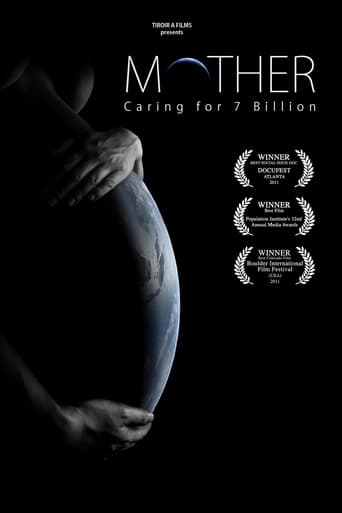Izzy Fallangy
Finally, a film which connects the dots between women's rights - populations growth - growth of environmental degradation and poverty. It breaks the 'taboo' of the real main factors behind ecological degradation and the ongoing (and growing!) abject poverty for let's not forget: 1 in 7 people today! Real main factors people have either never connected together, or are choosing denial. Seriously, since we are not TODAY managing and sharing our limited resources properly, how on earth do we expect we will all 'magically' manage and share better when the number of people in need have doubled by 2050 in some places? It's just not realistic, whether we like it or not, and we need to take responsibility NOW. Please watch and show to your local media and political representatives; family, friends and colleagues!
Jane O'Sullivan
"Mother" is a beautifully crafted, compassionate and uplifting journey through the issue of population growth, what it means for humanity's future prospects and what can be done. It features courageous women in Africa who are standing up to traditional views and who appreciate that family planning means more than their own reproductive rights, it is the key to breaking the cycle of poverty. Interviews with the greatest authorities on the subject are woven into a personal journey of one American mum facing up to her own cultural conditioning, and finding that concern for the next generation does not require parents to be constrained, but to be empowered.
Robert Simpson
First off; it is not, as advertised the only movie on population. It may be one of the few to discuss the connection between the empowerment of women leading to fewer children. As far as it went, it was an excellent film and I showed it legally to our local Sierra Club group. It was well received by all and I felt it was well made and made many good points. The only fault I had with the film was that while it was breaking one 'taboo', it was avoiding or ignoring an even stronger, more scary subject; that role which organized religion plays in controlling population. We will have to wait for that watershed moment and in the USA, the requirement for announcing your religious beliefs has become almost pandemic to the point where any politician not talking about their religion is akin to failing to praise the troops or not wearing a American flag lapel pin. There are many ways that population levels can start being reduced, but first people can't be afraid to talk about it. Without that next step being taken, very little progress can be made.
rmaskell-459-841435
In 1970, world population was 3.7 billion which was then regarded as a major contributor to the global environmental crisis. By 2011, world population has risen to 6.8 billion and technology has proved to be a double-edged sword: on one hand, increasing life expectancy, food and goods production; on the other, resulting in unsustainable population growth with concomitant major problems for humanity's continued existence. Infrastructure in most countries has failed to keep pace with the growth being relentlessly promoted by various pressure groups, and in some countries, aspirational middle classes that previously did not exist, all wishing to live at the massively unsustainable consumption level of the United States, have been created.Empowerment and education of women is seen as the primary solution to this impending disaster. Despite advances in contraceptive methods, many pregnancies are unplanned even in advanced societies. However, population growth is greatest in patriarchal societies where women are uneducated and disempowered. If fertility rates can be reduced and the present insatiable urge for growth be curbed, the concepts of Mother Earth and women as agents of global survival are twinned.



